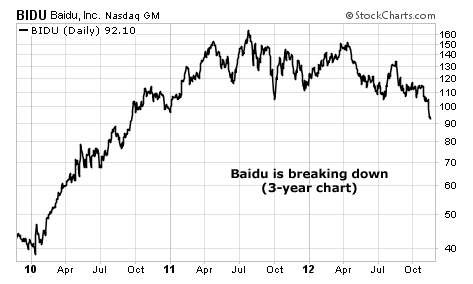| Home | About Us | Resources | Archive | Free Reports | Market Window |
Japanese Stocks Are Up 400 Points in Three Days... More to Come?By
Tuesday, November 20, 2012
Are you ready to pay money... just to keep your money in the bank?
That's what the incoming leader of Japan wants...
The head of Japan's LDP party – Shinzo Abe – says he wants Japan's central bank to print money in "unlimited" sums. And he favors "zero-to-negative interest rates" in Japan.
Negative interest rates force money out of savings – and force some of it into stocks and real estate. Long story short, Japan's blue-chip stocks could soar...
Japanese stocks are already up 400 points in just the last three days, bringing Japan's benchmark stock index (the Nikkei) to 9,150. But that's nothing...
The index was over 10,000 earlier this year. That's a long way from its all-time highs of near 40,000 at the end of 1989.
In short, you haven't missed a thing... yet.
Elections in Japan are on December 16, and polls say Abe's party will win. So this zero-to-negative interest rate policy looks like it will be the country's plan.
So how can we play it?
Longtime DailyWealth readers should be familiar with what I call the "Bernanke Asset Bubble." It's the idea that stocks and real estate in the U.S. should soar to unimaginable heights, as the Federal Reserve has pushed interest rates to zero and is printing money.
Now, the Bernanke Asset Bubble has "gone global." And it appears Japan will be the next country drinking Fed Chairman Ben Bernanke's Kool-Aid.
Buying Japanese stocks is the best way to take advantage of the situation...
First off, Japanese stocks are ridiculously cheap. Secondly, the possibility of a weaker currency will help Japanese stocks – particularly exporters (from automakers to electronics makers). A weaker yen makes Japanese exporters more competitive internationally.
To show how cheap Japanese stocks are, consider the WisdomTree Japan SmallCap Dividend Index (DFJ). It holds hundreds of Japanese stocks, most of which have a market value of less than $2 billion.
This index is trading at an incredibly cheap 0.65 times book value. Book value, as you may know, is a rough measure of "liquidation" value – assuming you sold all the company's assets and gave the money to stockholders. It is crazy that the stocks in this index would have to rise 50% just to get to "liquidation" value.
For comparison... the U.S. stock market trades at over two times book value. So Japanese small-cap stocks would have to rise three-fold just to be in line with U.S. stocks.
The story is the same when you look at another measure – price-to-sales. These Japanese stocks trade at 0.33 times sales. They would have to soar four-fold based on this measure to be in line with U.S. stocks.
In short... Abe wants to impose the Bernanke Asset Bubble on Japan.
The best way to play it is through a basket of Japanese stocks – like DFJ. Check it out...
Good investing,
Steve
Further Reading:
The Bernanke Asset Bubble has gone global... and is breaking into emerging markets. According to Steve, these markets are cheap and hated. Now, the uptrend is emerging. And based on history, investors could see 25%-plus returns in just over a year. Learn more here: The Bernanke Asset Bubble Has Finally Gone Global.
Market NotesTHE "GOOGLE OF CHINA" IS BREAKING DOWN Traders take notice... One of China's biggest winners is heading lower.
It's hard to find a bigger success story than Baidu. Traders and investors know the company as "the Google of China." Baidu spent years holding off Google in the struggle for China's online search market. Google ended up pulling out of China completely in early 2010, sealing the victory for Baidu.
Baidu's rise from underdog status to "Google of China" sent shares up 3,000%-plus from 2006 to 2011. However, Baidu's latest results show the company could be in trouble. Despite an 80% market share in the online search market, Baidu has lost ground to competitors in recent months.
At the same time, advertisers across China are tightening their budgets. That means less spending on ads that appear alongside Baidu's search results. Investors are also worried that Baidu doesn't have the same monopoly-type status when it comes to using the Internet on mobile phones.
As you can see in today's chart, Baidu's stock is under brutal selling pressure right now. Shares just plummeted to a two-year low.
– Larsen Kusick
 |
In The Daily Crux
Recent Articles
|


